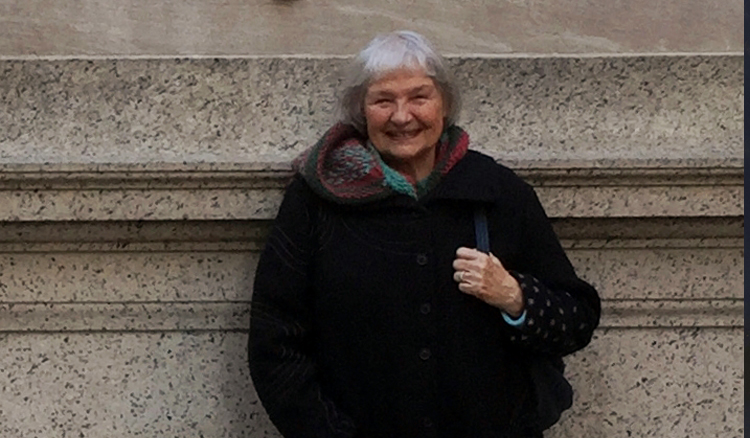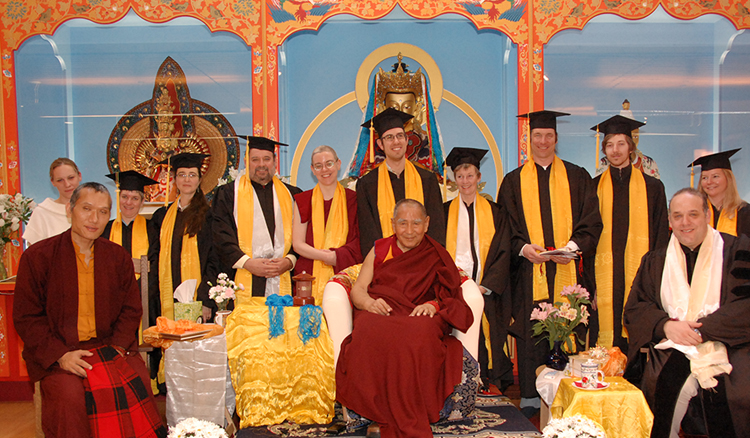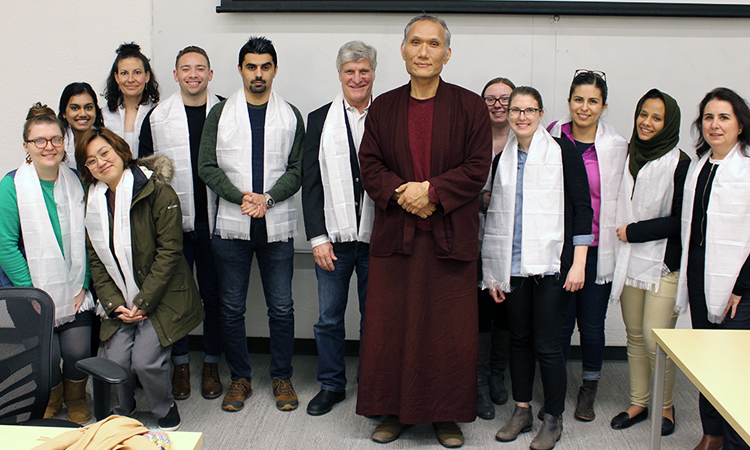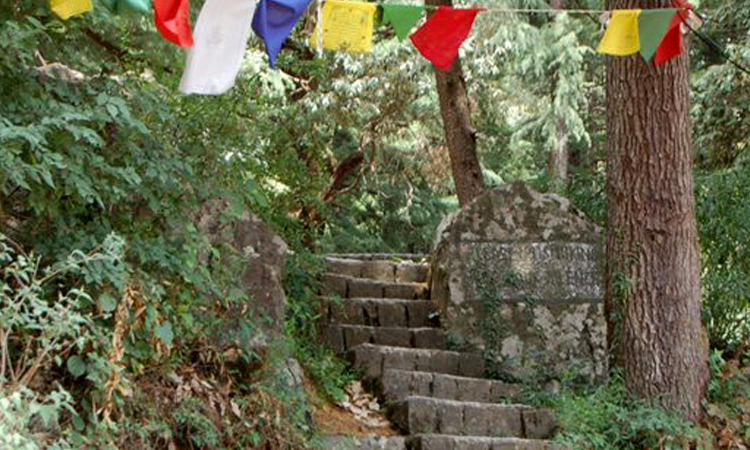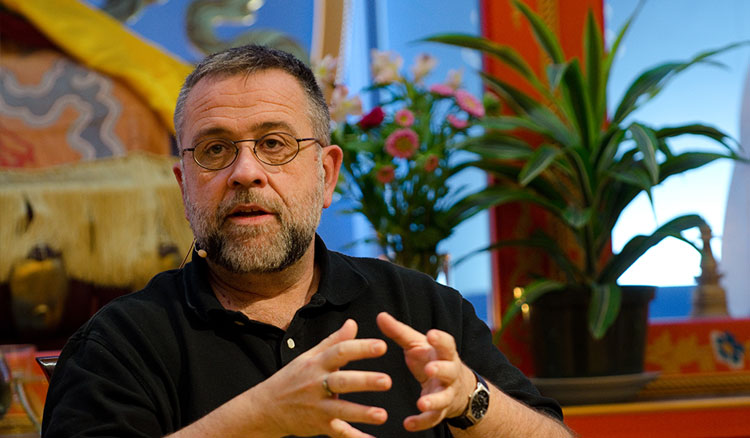“Responding to the Environmental Crisis: Climate Activism from a Buddhist Perspective” by Yangsi Rinpoche
This post is edited from the transcript of a talk given in February 2021 by Yangsi Rinpoche as part of a series at Dharma Friendship Foundation called “Interdependence and our Ecological Crisis: Responding with Wisdom, Compassion, and Justice”.
This Is a Drill
I am not necessarily an expert on this topic, but with pure intention, I will share some thoughts.
In the late 1970’s, when I was eight years old, I moved from Nepal to South India where the three great monasteries of Tibet (in exile) are located. Around the monastery, there is a small river, and I used to go swimming in the river as a child. Although I was too young to understand what was really happening, I remember noticing that the rainfall was decreasing every year. Every year, the river was drying up slowly, getting more and more sandy. Eventually, we were unable to swim there at all. The river has totally dried up by now. At that time, we didn’t know why. But we were witnessing climate change.
And for the last couple of years, we have had severe forest fires in Portland. Last year we had to run away because the air quality was so poor. As you know, this is happening due to extreme weather.
And since 2020, we have been living with COVID.
All of these events are connected to a disregard for nature.
We should see the recent events that we have undergone as a drill. If the climate crisis becomes very serious, we may experience a situation 100 times worse than what we are facing now. When a serious climate crisis arises, we may not even be able to breathe.
From a strictly Buddhist perspective, the water drying up, being unsuitable to drink, and having unclean air and so on, is our collective karma. We are all responsible. It is not just the politicians. Big, greedy companies play an important role, but we all are responsible. It is only a matter of degree. We all are part of the problem.
We have a tendency to blame and point the finger to others. But from a big picture point of view it is our lifestyle, how society functions, our energy consumption—all of this is also to blame. As long as we do not acknowledge that we are part of the problem, even if we actively engage in activism, there will be aggression, because our action is based on “They are wrong. I am right.”
From the collective point of view, we humans are currently caught in a crisis of consumption. Our individual footprint is contributing to the climate crisis. Acknowledging this is very important. There are so many things that we do to contribute to this.
So how are we going to live?
This is a difficult question. There is no single solution.
But first, as individuals, we must acknowledge what is going on. This is important.
How do we do this?
We should start by recognizing that we are not totally doomed. The younger generation is taking more and more responsibility for the future of the planet. They have a lot of interest and they are paying attention. This is wonderful and there is hope.
Our Minds Must Be at the Center of the Solution
Some years ago, the great master Samdhong Rinpoche gave a talk at Maitripa College about the environment. He mentioned that this planet has enough resources to meet the needs of the seven billion people on the planet, but that this planet does not have enough resources to fulfill one individual’s greed. That encompasses the entire picture.
It is so unfortunate that making money seems fundamental to the vision of this country, and, more and more, to the world. Because of that, we find ways to pollute everything: our vegetables, our milk, and even our water. To change this, fundamentally, the way we educate people needs to change. It is very good that the younger generation is paying attention to the climate, but we want to make sure that we do not create an angry young generation. That will be very sad.
For all of us, engaging in change with a mind of anger and frustration causes our actions and the energy we invest to become counterproductive. And then we cannot help. We need to look at the ways we engage carefully. We must realize that our minds must be at the center of the solution. This is not philosophy or spirituality. It is practical. The ultimate solution is that the human mind must change to become less greedy.
I heard that in Scandinavia, if you are extremely rich, people think you are imbalanced or have some sort of psychological problem, because your needs are fulfilled and yet you continue to reach beyond that. This is very interesting. There, they do not embrace excess or wealth. This shows that training the mind can create a reasonable way of living.
So how can we utilize our human energy in a balanced way when we look around and see so much trouble?
In a way, the human frustration we feel when witnessing all of this is good. To a certain extent, frustration can become a condition for motivation. But if our response to frustration is “I am right and they are wrong,” that is counterproductive. It is not necessary for all of us to have similar ideas and approaches. This is part of human existence.
Frustration is an internal energy that can wake us up and be channeled as awareness, as compassion. This is important. Climate activists are similar to bodhisattvas, shouting out for the suffering of samsara. This is about everyone’s survival. They have an extremely wonderful vision. But our awareness needs to be developed. “I am right. They are wrong” is counterproductive and is not going to work.
Activism and the Path of Protest
So much of climate change activism comes through understanding and thought, or intellect and concepts. That is really good. But if you do not calm your mind and you engage solely through logic and reason, it may be counterproductive. Although you are engaging, it is mixed with noise because there is anger and frustration. Your state of mind needs to be calm.
Sometimes activism, especially through demonstration and protest, comes with the strong feeling that “They are wrong.” When we come with that attitude, the natural feeling that arises to accompany the thought is aggression. This makes it impossible to change anything for the better.
So yes, they are wrong. But I am wrong, too.
Acknowledging that I am part of the problem is fundamental here. If the energy of the protest is based on “I am right. They are wrong,” it will be counterproductive.
In general, the purpose of activism is to create awareness. It is unfortunate that until things become extreme, people don’t notice. So protesting is a way to create awareness, and awareness leads to change. But this kind of activism needs to be supported by a good plan as well as the big picture.
We need to remember that protesting is not the only answer. It is only one of the methods. The larger purpose is to create awareness as a foundation for healthy change.
And ideally, we will find multiple pathways through which to create awareness. Activism becomes frustrating when we focus on only one path, just the path of protest. If activism incorporates multiple pathways to create change through awareness, there is more hope. Protests and demonstrations are powerful but we also need to pay attention to individual change.
If each of us as climate activists can engage in all these different areas, we will be less frustrated and more productive. It may be true that mantra recitation alone will not stop global warming, but, when you think about it, protests alone will not stop it either. Everybody needs to see multiple pathways to create awareness and then change.
We need to channel the energy of activism in many areas to tackle climate change. Each of us can channel it into four or five areas, not just one. This will definitely be more productive. Ideally, I think we should spend 50% of our activist energy on planting trees, rehabilitating the land, saving water, and so on, and the rest on policy change.
And of course, ultimately, from the Buddhist perspective, there is no perfect world until we are enlightened.
Rejoice in Simple Actions
Another point is about rejoicing.
Usually in our lives we engage in actions, but barely rejoice that we have done them, and instead we fantasize intensely about the final goal. This creates imbalance, pressure, and a sense of hopelessness. Generally, we all have a vision of what we want and a goal that we are trying to get to; but it will be more productive for us to spend our time rejoicing in our actions rather than dreaming about the goal.
Rejoicing in our actions becomes the source of inspiration. When we rejoice, our actions begin to flow naturally without any push and pull. This natural flow is created by inspiration, which is created by rejoicing in the simple things that we do on a daily basis.
If we focus too much on the end result, we can fall into difficultly. At the same time, of course, we should never forget the end goal. We have to have that vision to drive our energy.
There is a story about the ancient master Asanga. Asanga went into the mountains for a long retreat. Every three years, he would get disappointed and give up the retreat. Each time he tried to give up, he came out and saw an example of simple change resulting from simple action. Seeing that became the source of inspiration for him to go back into his retreat. But after three more years, he got frustrated and tried to leave the retreat. And again, coming out, he saw an example of simple change resulting from simple action. This happened four times in total. We have something very important to learn from this.
In general, we, all of us, prefer to see big changes while expending little effort. And, we are not able to generate inspiration as a result of simple actions. We fall into these two extremes. But when we rejoice in small actions, we train ourselves to cultivate inspiration from simple things. On this basis, big changes will happen.
Rejoicing, appreciating, and getting inspired by simple actions becomes oxygen for our lives.
Behind the Clouds: What Does It Mean to Be Human?
Ultimately, what is underlying all of this is a problem of a lack of awareness of interdependence. We need to make interdependence a part of our education: everyone needs to have an education about interdependence and the rest of education should be built on understanding it. Understanding interdependence should be the foundation of any culture that we build. This is the total opposite of the way we are living now.
Today, there are two parts to being human: the sad part of being human is that we are caught in a wave of greed and culture of consumption. And the hopeful part of being human is that we can create change.
People from another planet cannot do it for us. We cannot expect buddhas and bodhisattvas to make change. We are the only people who can make a difference. We created the mess. And we have the capability and the responsibility to clean up the mess.
Deep down, we, as human beings, are good. This is our true nature. We are not bad-natured. We are just caught in this hurricane. Therefore we are nervous and tense. But when our minds are balanced and settled, we are much more open.
So we need to create a conducive environment for change around us. We need to create a mind of ease and openness, so we can shine better. Humans are not negative by nature. Humans are beautiful, with caring and sharing natures.
Identifying with anything strongly from a negative point of view will not help us solve our problems. This is true of external things, and it is also true of ourselves. If we don’t acknowledge or identify ourselves as positive by nature, we do not see our capacity for positive change. We only see the negative, and that is counterproductive.
It is true we are caught in this wave of consumption, not only individually, but also collectively. But it is also true that this is situation is conditional, and impermanent.
Deep down I really believe that people are good. We are open and full of humanity. We become closed due to conditions.
As an example, Portland is overcast most days, but from time to time the sun shines. In the same way, from time to time our humanity and openness shines through. Most of the time our minds are overcast due to greed and so on. But behind the clouds, there is blue sky.
But What Can I Do to Help?
So what can we do immediately? This is an important question.
Immediately, planting trees is what is most important.
It is also very important to engage in rehabilitating land—any land that was green once upon a time but became dry due to human consumption. When we rehabilitate the land, the water will come back, the rain and the birds will come back. These are things that we can do immediately. Long term, we have to redesign the way we live, and plan our cities. As individuals, as communities, we need to think about how we can decrease our carbon footprint.
We also need to be careful with water. When I take a shower, I use a bucket to collect the water and use it later to flush the toilet. Accumulating too much garbage is another way we can work for change. We should try to create less garbage.
In general, we human like to see change immediately, which is impossible, and so when it does not arise immediately we feel frustration. But, as we discussed earlier, that energy can be channeled into planting trees, engaging in land rehabilitation, and so on. We can distribute our frustrated energy into activities to make a better future for all of us.


